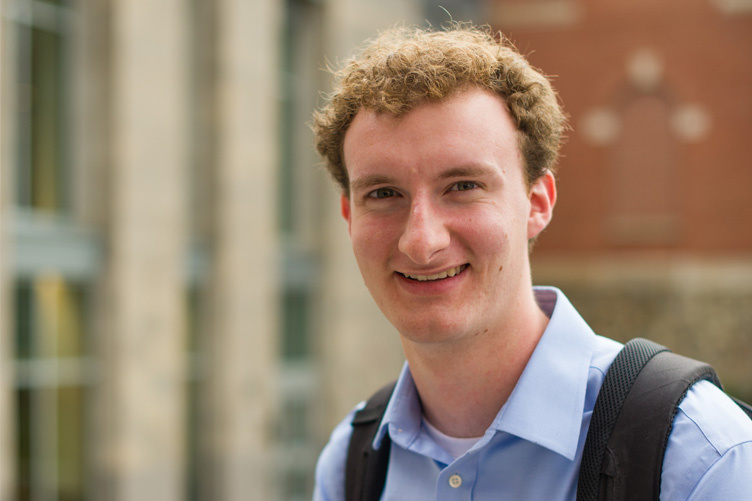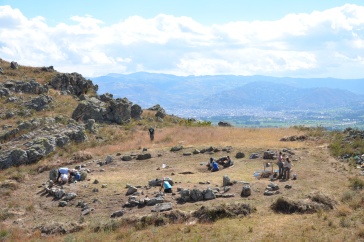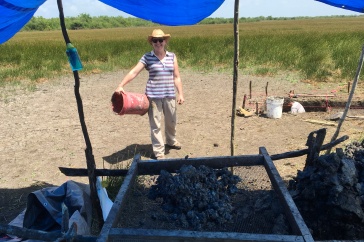
Andrew Ware.
He’s a senior economics and philosophy major from Manasquan, New Jersey, and a UNH Presidential Scholar in the Honors Program. In this interview, Andrew Ware discusses his favorite UNH experiences, what he did in England last summer (hint: it was really cool funded research) and why it’s great to be a student in the College of Liberal Arts.
The College Letter (TCL): Why did you choose to come to UNH?
Andrew Ware (AW): I chose to attend UNH because it had strong programs for what I intended to study and because it would also allow me to explore other interests. Further, it was clear that UNH offers an amazing diversity of opportunities, including study abroad and research experiences. From the minute I set foot on the beautiful campus, I found a friendly, welcoming community of faculty, staff and students.
TCL: Are you involved in any groups, clubs or organizations? If so, which is your favorite?
AW: I am involved in several organizations, including the Rines Angel Fund (a student-run angel investment group in the Paul College), the Student Honors Council and the Socratic Society. It is challenging to choose a favorite, but I greatly enjoy the Socratic Society. The Socratic Society is a student-led group, comprised of individuals from a variety of majors and backgrounds. The group meets weekly to discuss current events and interesting topics from a philosophical perspective. It is fantastic to engage in discussion and debate topics ranging from higher education to cultural globalization to “alternative facts” and the nature of truth — especially considering the distinct views each person brings to the conversation. At the end of each discussion, we rarely form a consensus, but we always learn from each other and think about things differently.
TCL: What is your favorite class and why?
AW: Social and Political Philosophy (PHIL 436), with Professor Nick Smith. I took the course my first semester at UNH, and I found it to be fascinating. I am very interested in technology and its implications, and the course explored the intersection of technology, society and politics from a philosophical perspective. It opened my eyes to a discipline I did not realize I was so passionate about, and ultimately led me to pursue degrees in philosophy and economics — as well as research in the considerations of the development of artificial intelligence.
TCL: Can you explain the research you undertook at the University of Cambridge last summer?
Note: Ware was among the first recipients of a Grand Challenges Research and Innovation Grants through the UNH Hamel Center for Undergraduate Research, supported by the Grand Challenges in the Liberal Arts Initiative. Ware co-authored an impressive evidence document about artificial intelligence that was submitted to Great Britain's House of Lords.
AW: I explored the implications of the potential application of artificial intelligence (AI) to resource management. Essentially, I focused on the ethical, economic and technological considerations associated with developing AI that could someday distribute resources in an effective, efficient and equitable way. To that end, my research consisted of speaking with academics who are experts in the field of AI and other “existential risks” (risks that could lead to the extinction of humans or the collapse of civilization) as well as policy-makers who are responsible for mitigating the risks and maximizing the benefits of technology. Through these interviews and discussions, as well as attending workshops that addressed relevant issues, I developed an understanding of the most significant potential risks and benefits of AI applied to resource management. Additionally, I developed policy suggestions to mitigate risks and maximize benefits.
TCL: How has this research experience impacted you?
AW: My experience at Cambridge gave me the opportunity to further develop my skills of communication and collaboration while also improving my ability to work individually. The independent nature of my research let me focus on the aspects of the project that I found most interesting, and it was wonderful to engage in discussion with academics who are experts in the field of AI and other existential risks. It was fascinating to hear their many distinct perspectives, and to engage in thoughtful discussion regarding issues with such significance to humanity and its future. Ultimately, my research experience has highlighted the importance of clearly articulating my thoughts and carefully listening to others.
TCL: What is the best thing about being in the College of Liberal Arts?
AW: The faculty members of COLA are amazing — throughout my experience at UNH, they have been knowledgeable, enthusiastic, and — most significantly — encouraging. Beyond sharing knowledge, understanding and experience regarding course material, they have encouraged me to pursue opportunities on campus and abroad, and have helped me to benefit greatly from educational experiences beyond the classroom.
TCL: What has been your favorite experience at UNH?
AW: Studying abroad in Budapest, Hungary, in 2016 through the Humanities Spring Budapest Program was an incredible experience. During the semester, our group had the opportunity to learn more than I could have imagined in classes while also experiencing European culture and greatly broadening my perspective. The Hungarian professors provided an abundance of knowledge and ideas, sharing material as well as places to see and things to do in and around the city relevant to the course of study. Simultaneously, our UNH professor Nick Smith integrated experiences outside of the classroom with the material we were studying in class and encouraged us to travel throughout Europe. Overall, it was an engaging educational and cultural experience unlike any of my past experiences.
TCL: What’s the most important lesson you’ve learned at UNH?
AW: I have learned that it is important to use available resources, and that embracing opportunities can be both beneficial and rewarding. UNH offers programs that provide excellent experiences and has faculty and staff who are helpful and encouraging. Using the exceptional resources at UNH provides a solid foundation for limitless possibilities for the future.
TCL: What do you plan to do after graduating?
AW: I'm looking forward to attending law school, and to continuing to explore the nexus of philosophy, economics and technology.
-
Written By:
Susan Dumais '88 '02G | College of Liberal Arts

















































